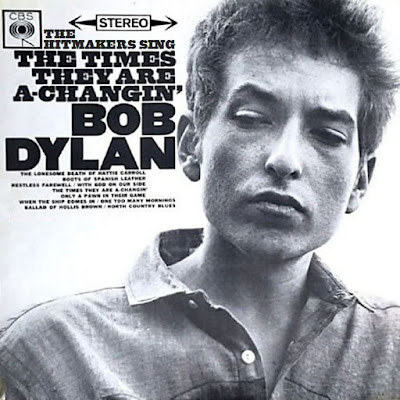Whereas Bob Dylan's previous albums, 'Bob Dylan' and 'The Freewheelin' Bob Dylan', combined original material and cover songs, 'The Times They Are A-Changin'' was the first to feature only original compositions. It consists mostly of stark, sparsely arranged ballads concerning issues such as racism, poverty, and social change, and the title track is one of Dylan's most famous, with many feeling that it captures the spirit of social and political upheaval that characterized the 1960's. Some critics and fans were not quite as taken with the album as a whole, citing its lack of humour or musical diversity, but it still peaked at No. 20 on the US chart, eventually going gold, and belatedly reaching No. 4 in the UK in 1965. Work had begun on 6 August 1963, at Columbia's Studio A, with Tom Wilson once again as producer for the entire album, and the session yielded a usable take of 'North Country Blues'. Another session at Studio A was held the following day, this time providing master takes of four songs: 'Ballad Of Hollis Brown', 'With God On Our Side', 'Only A Pawn In Their Game', and 'Boots Of Spanish Leather', after which sessions did not resume for more than two months. During the interim, Dylan toured briefly with Joan Baez, performing a number of key concerts that raised his profile in the media, and when he returned to Studio A on 23 October he had six more original compositions ready for recording. Master takes for 'The Lonesome Death Of Hattie Carroll' and 'When The Ship Comes In' came from this date, and on 24 October final takes of 'The Times They Are A-Changin'' and 'One Too Many Mornings' were recorded. The final session took place on 31 October, and the entire session focused on one song — 'Restless Farewell'— whose melody is taken from an Irish-Scots folk song, 'The Parting Glass', and it produced a master take that ultimately closed the album. Almost as soon as the album appeared in February 1964, Peter, Paul and Mary covered 'When The Ship Comes In', and by the following year Manfred Mann had charted with their version of 'With God On Our Side', while The Seekers had recorded the title track and Nina Simone covered 'Ballad Of Hollis Brown'. Most of these versions are from the couple of years following the release of the album, but it took until 1988 before someone tackled 'Only A Pawn In Their Game', and 2001 for a cover of 'Restless Farewell' to follow Joan Baez's version in 1968, so here they all are on this tribute to a classic Dylan album.
01 The Times They Are A-Changin' (The Seekers 1965)
02 Ballad Of Hollis Brown (Nazareth 1973)
03 With God On Our Side (Manfred Mann 1965)
04 One Too Many Mornings (The Beau Brummels 1966)
05 North Country Blues (Joan Baez 1968)
06 Only A Pawn In Their Game (The Lenny Nelson Project 1988)
07 Boots Of Spanish Leather (The Silkie 1965)
08 When The Ship Comes In (Peter, Paul And Mary 1964)
09 The Lonesome Death Of Hattie Carroll (Phranc 1985)
10 Restless Farewell (Norman Blake & Peter Ostroushko 2001)




